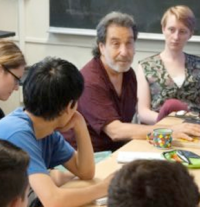44th Annual MLK Celebration Leadership Award Recipient: Lee Perlman
Lee Perlman PhD ’88
Founding Director, MIT Prison Initiative
Senior Lecturer, MIT Experimental Study Group
44th Annual MLK Leadership Award

Breaking down walls between the ivory tower and prison
MIT News, 24 May 2017
The MIT Prison Initiative provides an academic framework for undergraduates and local inmates to explore the human condition.
In 1987, while teaching a class at MIT on nonviolence, philosophy lecturer Lee Perlman had a novel idea: Why not take the students to a prison, to talk with men who had committed extreme forms of violence?
Needless to say, the experience was an eye-opener for students — a powerful way to help them understand, at a visceral level, the nature of violence. And it also sparked Perlman’s lifelong professional and personal interest in the prison system. That interest continues today in the MIT Prison Initiative he founded in 2016 with the support of his home department, the Experimental Study Group (ESG). Through the initiative, Perlman teaches classes to a cohort of both MIT students and prisoners at two medium- to maximum-security Massachusetts Correctional Institutions in Norfolk and Framingham.
Over the past academic year, Perlman has taught two philosophy courses at the prisons: ES.S40 (Self and Soul) and ES.112 (The Philosophy of Love). Each week, Perlman and 10 MIT students traveled by van to Norfolk or Framingham to engage in discussion and study with 10 imprisoned fellow students, many of whom are incarcerated for life.
“The kinds of courses I’m developing for the MIT Prison Initiative are designed to allow students to speak about their personal experience, but do it within a serious intellectual framework,” Perlman explains. Taught as part of ESG’s General Institute Requirement offerings in the humanities and social sciences, these courses reflect the program’s emphasis on “out-of-the-box” educational experimentation and on teaching and learning as part of an academic community.
Teaching philosophy in a prison setting broadens the perspective and learning of both student cohorts, by exposing them to people and life experiences vastly different from their own. That’s certainly been the case for freshman Eva Lisowski. “Dr. Perlman’s Self and Soul class was one of the most life-changing and influential opportunities I have ever had,” she says, adding: “Being able to actually look into the inmates’ eyes and have an intelligent discussion about advanced philosophy readings with them completely changed how I view them.”